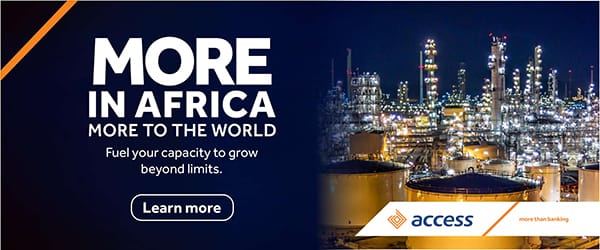Nigeria Needs Bold Reforms to Unlock Economic Potentials – PAC Capital
Following a gradual economic growth rebound, Nigeria is now on the path to recovery says PanAfrican Capital Holdings in its macroeconomic update. However, the firm said Africa’s largest economy needs bold reforms to unlock the nation’s economic potentials.
In the first quarter of 2021, Nigeria continues on the path of economic recovery with a real gross domestic product (GDP) growth rate of 0.51% year on year as reported by the National Bureau of Statistics.
Commenting on the outturn, PAC Capital said the recovery in the quarter is weaker than expected considering the significant progress that has been made in the fight against the spread of COVID-19 pandemic.
It said the growth rate in the review quarter is lower than the growth rate of 1.87% in the corresponding quarter of the previous year but it is an improvement compared with the growth rate of 0.11% in the fourth quarter of 2020.
The investment firm noted that the weak performance recorded in the quarter reflected the low level of activities that normally characterised the beginning of a new year and the spillover effects of the pandemic that pervaded the greater part of the preceding year.

It spotted that aggregate nominal GDP in the reviewed quarter stood at N40.01 trillion, higher by 12.23% compared with the N35.65 trillion in the corresponding quarter of 2020, but the nominal GDP is lower by 8.15% relative to the N43.56 trillion in the fourth quarter to December 2020.
Analysts said moreover, in the review period, out of the forty-six economic activities in the nation’s GDP basket, twenty-three recorded positive growth compared with the seventeen in the preceding quarter while the remaining twenty-three recorded various levels of decline.
“It is worthy of note to state that, most of the economic activities that recorded various levels of decline displayed some level of resilience as the weaknesses moderated in the review quarter.
“In our view, the economic growth rate in the quarters ahead is expected to strengthen with improvement in the prices of crude oil and production.
“However, to achieve sustainable economic prosperity, there is a need to address structural imbalances in the economy with bold economic reforms that will unlock the nation’s economic potentials”, PAC Capital explained.
Data showed that the real GDP growth rate in the review quarter was driven by the performance of the oil sector. Oil sector recorded growth rate of 17.55% in the quarter and contraction of 2.21% year on year relative to the contraction of 19.76% and the growth rate of 5.06% in the preceding quarter and in the corresponding quarter of the previous year respectively.
Furthermore, analysts said in the economic update that the performance of the oil sector was driven by the improvement in both the prices of crude oil and production.
In the review quarter, Brent Crude Oil traded at an average price of US$60.17 per barrel, higher by 15.91% and 29.88% relative to the average price of US$51.91 and US$46.33 per barrel in the preceding quarter and the first quarter of 2020.
In addition, Brent crude Oil has recorded average price of US$62.42 year-to-date.
However, Nigeria recorded average crude oil production of 1.72 million barrel per day (mbpd) in the review quarter, higher by 10.26% relative to the average daily production of 1.56 million barrel in the fourth quarter of 2020.
But, this came lower by 16.91% when compare to the average daily production of 2.07 million barrel in the corresponding quarter of 2020.
“In our view, crude oil is expected to trade at an average price of US$60 per barrel in the current year”, PAC Capital said.
It said the projection was based on the expected sustainability in demand to be spurred by the widespread availability of COVID-19 vaccines and the ongoing inoculation globally.
On the other hand, the non-oil sector expanded by 0.79% in the period, lower than the growth rate of 1.55% and the 1.69% in the corresponding quarter of 2020 and the preceding quarter respectively.
In addition, the weak performance of the non-oil sector relative to the preceding quarter was driven by the services sector which recorded a contraction of 0.39% in the period.
Analysts said the oil sector contributed 9.25% to the overall output while the non-oil sector accounted for 90.75% in the period.
In Q1-2021 economic performance data, agriculture sector recorded the highest performance in the quarter. The sector recorded real GDP growth rate of 2.28%, marginally higher than the growth rate of 2.20% recorded in the first quarter of 2020 but lower than the 3.42% in the preceding quarter.
Economic activities in the sector comprise of crop production, livestock, forestry and fishery, however crop production accounted for 87.61% of the economic activity in the sector.
Crop production which is the major driver of agriculture sector recorded real GDP growth rate of 2.31% in the period, lower than both the growth rate of 2.38% in the corresponding quarter of 2020 and the 3.68% recorded in the fourth quarter of 2020.
Also, livestock and forestry recorded real growth rate of 1.65% and 1.28% accordingly in the period whereas fishery expanded by 3.24%.
Overall, agriculture sector contributed 22.35% to the output in the period, lower than the contribution of 26.95% in the preceding quarter but marginally higher than the 21.96% in the corresponding quarter of the previous year.
The performance of the industries sector reverses. For the first quarter to March 2021, the industries sector recorded real growth rate of 0.94% relative to the growth rate of 2.26% in the first quarter of 2020 and the contraction of 7.30% in the preceding quarter.
The review quarter’s performance is a reversal from the contraction recorded by the sector in the past three consecutive quarters.
Manufacturing sector was the major driver of the positive performance of the industries sector in the period with real GDP growth rate of 3.40% compared with the growth rate of 0.43% in the same period of the previous year and the contraction of 1.51% in the fourth quarter of 2020.
The economic activities that were responsible for the performance of the manufacturing sector are cement and food, beverage & tobacco. Further analysis revealed that cement economic activity recorded a strong growth rate of 11.20%, higher than both the growth rate of 1.67% and 6.59% in the first and the fourth quarter of 2020 accordingly.
“In our view, the increase in the rate of road construction all over the country is mainly responsible for the growth of the cement sector”, analysts said.
Furthermore, food, beverages & tobacco economic activities recorded real GDP growth rate of 7.11%, higher than both the growth rate of 1.10% and the 2.15% in the first and the fourth quarter of 2020 respectively.
Also, “other manufacturing” economic activities recorded impressive performance of 3.75% in the period, relative to the contraction of 1.78% in the corresponding period of the previous year and the contraction of 4.26% in the preceding quarter.
It is worthy of note to state that although mining & quarrying recorded a contraction of 2.19% year on year in the quarter, the economic activities recorded quarterly real growth rate of 16.25% in the period.
Industries sector contributed 23.75% to the overall output in the quarter relative to the 18.77% in the fourth quarter of 2020. Services sector plunges to negative territory after one quarter of positive growth.
In the review quarter, the performance of the services sector reversed with contraction rate of 0.39% relative to the growth rate of 1.57% and 1.31% in the first and the fourth quarter of 2020.
The services sector emerged from recession in the preceding quarter and its performance relapsed in the reviewed quarter due to the weakness in the performance of telecommunications sector.
Telecommunications sector recorded stellar performance of double-digit real GDP growth rate in the previous eleven consecutive quarters to the fourth quarter of 2020.
However, the sector recorded real GDP growth rate of 7.69% in the reviewed quarter relative to the growth rate of 17.64% in the preceding quarter and the 9.71% in the corresponding quarter of the previous year.
The number of economic activities that recorded positive growth rate in the period remained flat at seven relative to the preceding quarter while fifteen recorded various degrees of decline.
The sectors that supported services sector in the period are trade, financial institutions and accommodation & food services with real growth rate of 0.77%, 2.63% and 10.43% quarter on quarter respectively.
On the flip side, the performance of transportation & storage sector contributed to the weak performance of the services sector with a contraction of 21.89% relative to the contraction of 5.95% in the preceding quarter.
Services sector contributed 53.90% to the output in the period relative to the contribution of 54.39% in the same period of the previous year and 54.28% in the preceding quarter.
Nigeria Needs Bold Reforms to Unlock Economic Potentials – PAC Capital













